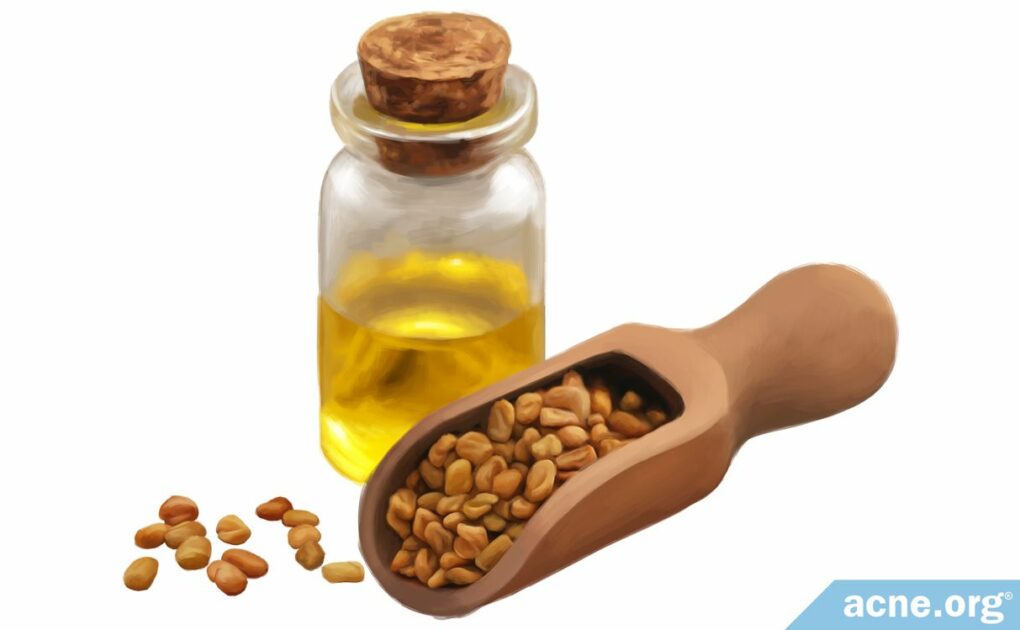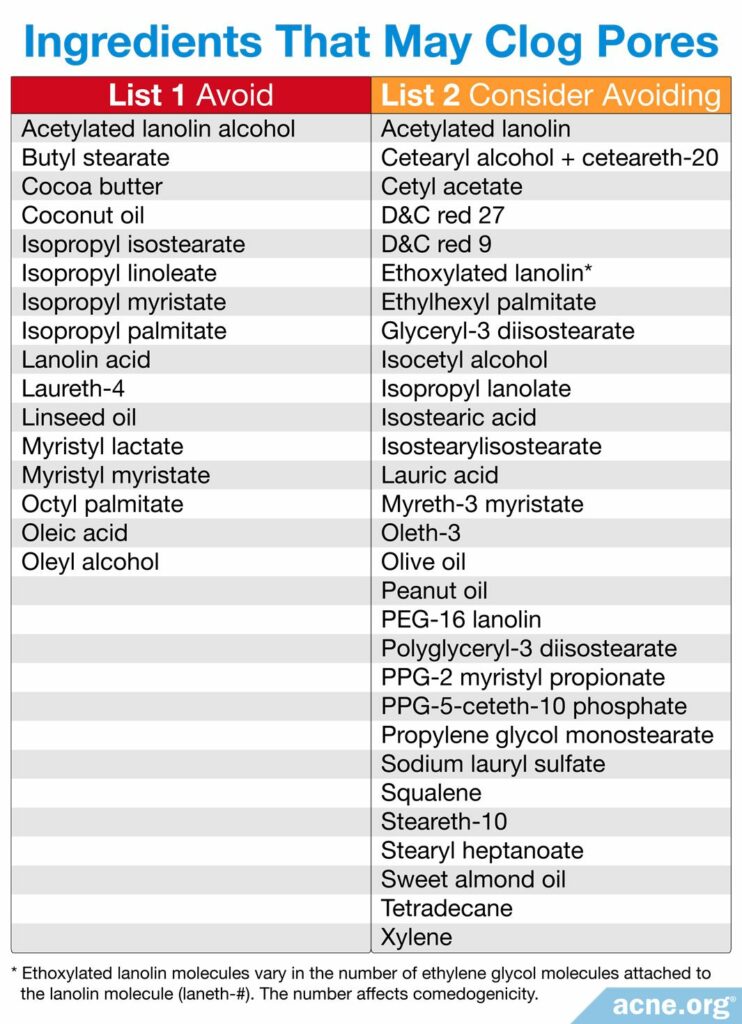It’s Too Early to Say. Fenugreek Shows Some Promising Medicinal Properties in the Lab but Has Never Been Tested on People with Acne.

The Essential Info
Fenugreek is a Mediterranean kitchen herb whose seeds possess some medicinal properties.
Fenugreek seeds have yet to be tested on people with acne. However, preliminary lab experiments suggest that fenugreek seeds might potentially offer some benefits for acne-prone skin. Specifically, fenugreek seeds might:
- Reduce inflammation: Excessive inflammation lies at the core of acne, so reducing inflammation may reduce overall symptoms.
- Fight free radicals: Free radicals are naturally-occurring toxins that may worsen acne, so fighting free radicals may improve acne.
- Kill acne bacteria: Acne bacteria live in skin pores and can intensify symptoms, so killing the bacteria may help with acne.
- Speed up wound healing: Acne lesions are small wounds that take time to heal, so speeding up wound healing may help acne to clear faster.
On the other hand, some weak, preliminary evidence suggests that fenugreek might also make acne worse by:
- Increasing skin oil production: More skin oil tends to mean more acne, so increasing skin oil production is undesirable for people who are prone to acne.
We need studies on real acne patients to tell us whether the benefits and drawbacks of fenugreek add up to make it a worthwhile home remedy.
We also need more research into possible side effects. So far, one study has reported on two cases of severe allergy to fenugreek seeds, but it is difficult to say how likely this reaction is.

The Science
- Side Effects of Fenugreek
- How to Use Fenugreek Topically
- Evidence for the Potential Impact of Fenugreek on Acne-prone Skin
- Evidence That Fenugreek Might Potentially Help with Acne
- Weak Evidence That Fenugreek Might Potentially Make Acne Worse
Fenugreek, or Trigonella foenum-graecum, is a plant of Mediterranean origin that is now grown worldwide. In Asia, fenugreek leaves and seeds are popular ingredients for curry powders, pickles, and spices, while cooks in the U.S. use fenugreek as a spice for soups and stews.1,2
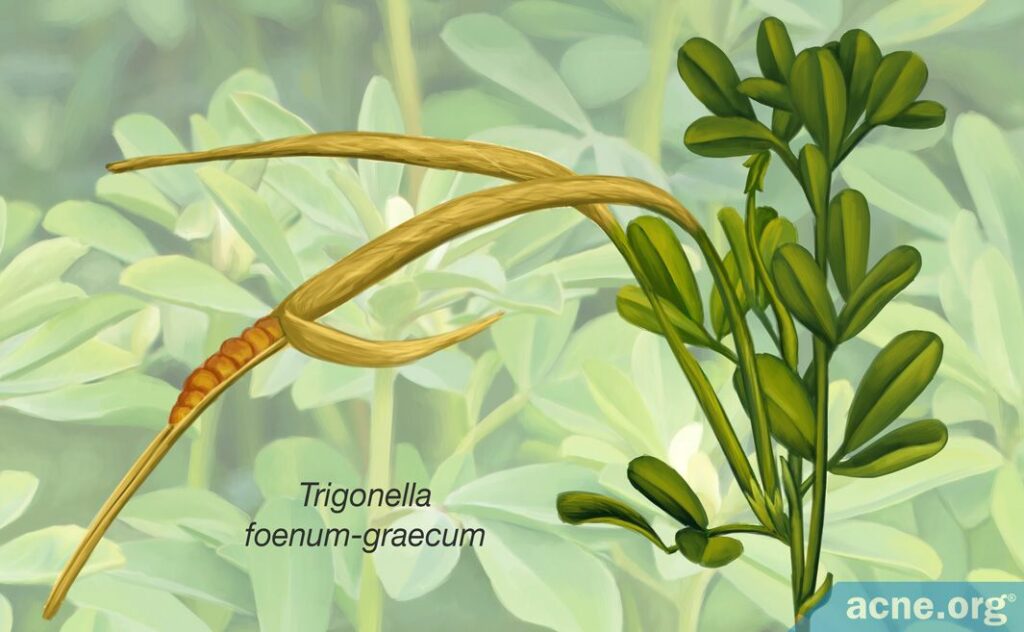
Fenugreek contains substances that may reduce inflammation. Since acne is an inflammatory disease, fenugreek might potentially help control acne. However, notice the emphasis on the word “might.” We won’t know until studies are performed on people with acne.
Some indirect evidence suggests that fenugreek may:
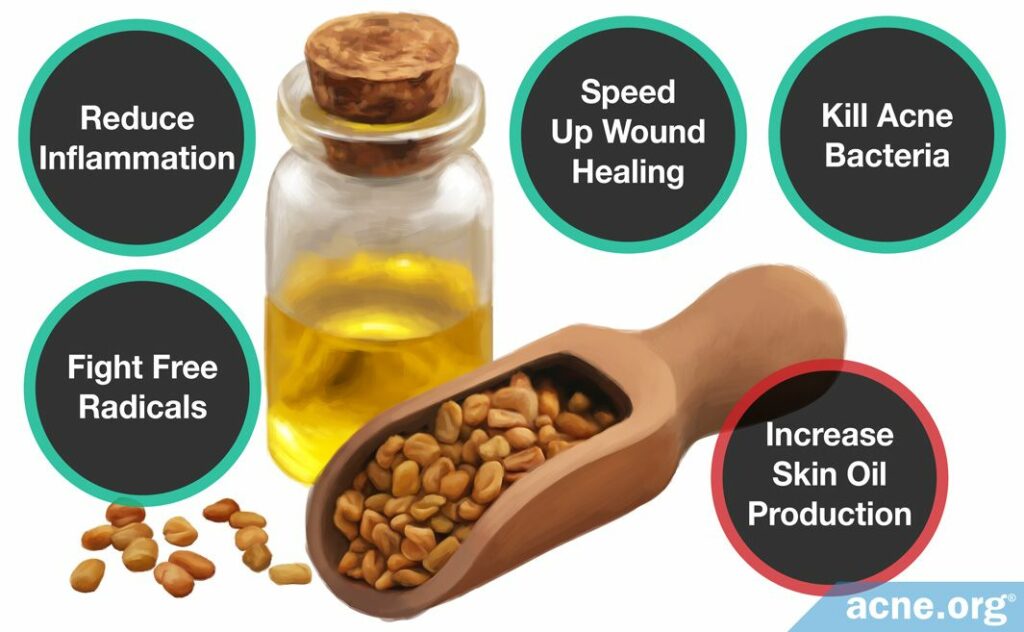
- Reducing inflammation: One study suggests that fenugreek may decrease inflammation, which lies at the core of acne.
- Fighting free radicals: One study suggests that fenugreek may fight free radicals, naturally-occurring toxins that may contribute to acne.
- Killing acne bacteria: Two studies indicate that fenugreek may kill acne bacteria, which tend to intensify acne.
- Speeding up wound healing: Two studies indicate that fenugreek may speed up the healing of small cuts and sores like acne lesions.
On the other hand, a small amount of preliminary evidence suggests that fenugreek might potentially make acne worse by:
- Increasing skin oil production: One study indicates that fenugreek might trigger the skin to produce more skin oil, which would tend to worsen acne.
In theory, it looks like the beneficial effects of fenugreek for acne might outweigh the harmful ones. However, we really cannot say how acne-prone skin would respond to fenugreek until studies test this treatment on real patients.
Side Effects of Fenugreek
Since very few studies have tested fenugreek seeds as a treatment for any medical condition, we know little of its potential side effects.

One study, published in Acta Poloniae Pharmaceutica – Drug Research in 2010, tested fenugreek seed extract on the skin of eleven volunteers and found that none of the volunteers developed skin irritation. The authors wrote, “[T]he formulation can be used safely without any significant skin irritation.”3

On the other hand, one case report published in the Annals of Allergy, Asthma & Immunology in 1997 described two cases of allergic reaction to fenugreek:
1. Allergic reaction to smelling fenugreek powder: A 36-year-old woman developed sneezing, runny nose, wheezing, and fainting spells after opening and smelling a jar of fenugreek powder.
2. Allergic reaction to applying fenugreek to the skin: A 45-year-old woman with asthma developed nasal congestion, hoarseness, numbness, swelling of the face, and wheezing after applying fenugreek paste to her scalp.4
This suggests that people prone to allergies and those with asthma should exercise caution when handling or consuming fenugreek. However, more studies are necessary to clarify the side effects of fenugreek and how widespread these side effects might be.
How to Use Fenugreek Topically
Where to buy
For topical use, you will need a liquid or oil extract of fenugreek. This may not be available at your local drugstore but can be ordered online.
Keep in mind that herbal remedies like fenugreek are unregulated by the U.S. Food and Drug Administration (FDA), which means these products may contain variable amounts of medicinal ingredients. In addition, some extracts may contain undesirable chemicals, such as pore-clogging (comedogenic) oils that may potentially worsen acne. Therefore, exercise caution when trying any new fenugreek product and keep an eye out for symptoms of skin irritation or acne flare-ups.
How to use
We have very little guidance for using fenugreek topically.
- From human studies: Only one small study has tested topical fenugreek on human volunteers. In that experiment, volunteers applied a fenugreek oil product to the skin daily for 6 weeks.3 However, we should note that the volunteers were acne-free and were not seeking the medicinal benefits of fenugreek.
- From animal studies: One study on animals administered topical fenugreek twice a day, and another study applied fenugreek once every 2 days. Both studies ran for several weeks.11,12 In these studies, researchers were testing the wound-healing benefits of fenugreek.
Taking the average of these three studies, a good place to start might be applying fenugreek extract to the skin once a day and monitoring your acne symptoms. Since any potential medicinal benefits are likely to be mild and gradual, you may need to use the extract for many weeks to notice any effect. Always be on the lookout for symptoms of allergy or skin irritation and stop using fenugreek if these occur.
If you want to know more about the indirect evidence suggesting that fenugreek might potentially benefit acne-prone skin, read on as we take a closer look.
Evidence for the Potential Impact of Fenugreek on Acne-prone Skin
Seven studies have investigated the medicinal properties of fenugreek that might potentially impact acne-prone skin. The table below gives an overview of these studies, and below, we will dissect each one and examine how strong the evidence really is.
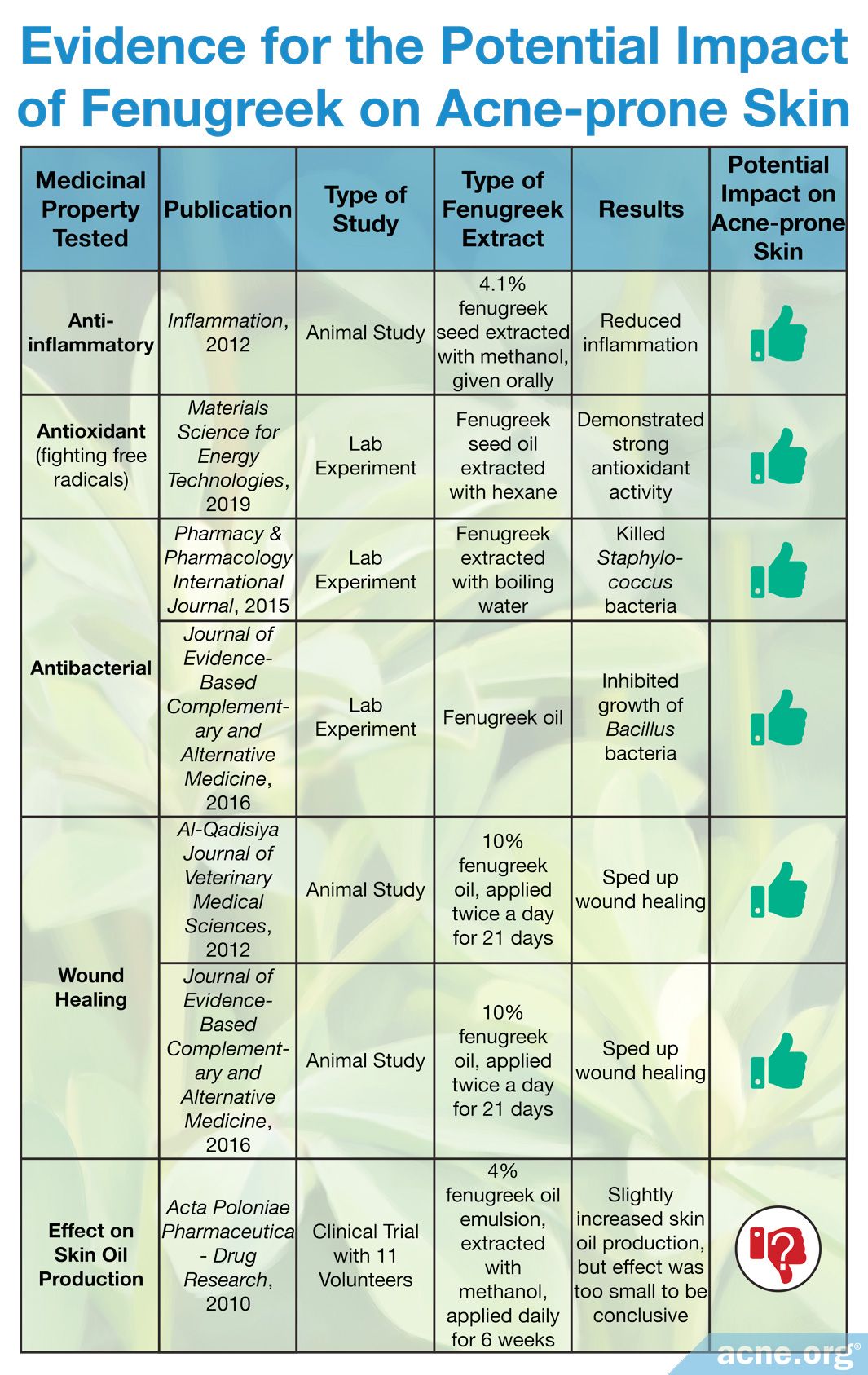
Evidence That Fenugreek Might Potentially Help with Acne
As you can see in the table, six studies have found indirect evidence that fenugreek might potentially help with acne by improving various factors that contribute to acne, such as inflammation. Let’s go through these factors one by one and examine the studies that show how fenugreek might be beneficial.
Caution – Deep Science Ahead: Read on if you’re interested in all the gory details. Otherwise, let me offer my personal opinion at this point. Usually natural or home remedies don’t do much to reduce acne. Chasing after the latest fad normally results in disappointment. Your efforts are most likely better spent researching proven treatments.
1. Evidence that fenugreek might reduce inflammation
One study found that fenugreek may reduce inflammation. In that experiment, researchers gave rats suffering from inflamed joints (arthritis) a fenugreek seed extract by mouth. They found that the extract reduced inflammation in the rats, resulting in improvement of the rats’ symptoms.5
Since this experiment tested an oral fenugreek treatment, we cannot be sure that topical fenugreek would necessarily have the same anti-inflammatory effect. In addition, it is important to keep in mind that this treatment helped rats but has yet to be tested on humans.
Expand to reveal more details of study

This study was published in the journal Inflammation in 2012. The researchers measured levels of anti-inflammatory proteins in the rats before and after treatment with fenugreek seed extract. They found that the levels of several inflammatory proteins called interleukins decreased after the treatment, resulting in improvement of the rats’ arthritis.
In their article, the scientists also mentioned a previous experiment in which taking fenugreek seed by mouth reduced pain in mice. Since pain is one of the effects of inflammation, this also indirectly supports the idea that fenugreek may reduce inflammation.5
Scientists speculate that certain chemicals inside fenugreek seeds, called alkaloids, saponins, and flavonoids, may be responsible for the anti-inflammatory effect.6,7
2. Evidence that fenugreek might fight free radicals
One study found that fenugreek might fight free radicals. In this study, researchers extracted fenugreek seed oil and measured its antioxidant activity, which means its ability to neutralize free radicals, in the laboratory. They found fenugreek seed oil to be a strong antioxidant.8 However, studies in humans are necessary to determine whether fenugreek seed oil would also work as a strong antioxidant on human skin.
Expand to reveal more details of study

This study was published in 2019 in the journal Materials Science for Energy Technologies. The researchers attributed the antioxidant activity of fenugreek seed oil to two types of chemicals: phenols and flavonoids. They wrote, “These results support the good antioxidant capacity of fenugreek seed oil.”8
3. Evidence that fenugreek might kill acne bacteria
All people have acne bacteria living on/in their skin, but in some people, these bacteria trigger an inflammatory response that makes acne worse.9
Two studies found that fenugreek may kill acne bacteria. We should note that neither of these studies tested fenugreek directly on acne bacteria, known as C. acnes. Instead, the researchers found that fenugreek may kill some similar bacteria. Therefore, we can speculate that it may also be effective against C. acnes, but we cannot be sure until further research directly tests this.
Study 1: In the first study, researchers tested the ability of fenugreek seed extract to kill various bacteria in the laboratory. They found that fenugreek could kill a type of bacteria called Staphylococcus, which is a Gram-positive type of bacteria similar to C. acnes. The researchers wrote, “[F]enugreek has some antimicrobial effect on all the species of Staphylococcus.”10 Therefore, this suggests that fenugreek may also be somewhat effective against acne bacteria.
Study 2: In the second study, researchers tested the antibacterial activity of fenugreek seed extract on a type of bacteria called Bacillus. They found that fenugreek seed extract inhibited the growth of these bacteria in the lab. Since Bacillus is a type of Gram-positive bacteria like C. acnes, this result strengthens the speculation that fenugreek may kill acne bacteria.11
Expand to reveal more details of these 2 studies
Study 1:

This study was published in the Pharmacy & Pharmacology International Journal in 2015. The researchers compared the antibacterial effect of fenugreek seed extract to that of a common antibiotic called gentamycin. The tested bacteria included three species of Staphylococcus as well as E. coli, C. albicans, and P. vulgaris. In general, fenugreek extract killed the various types of bacteria less effectively than gentamycin. However, for Staphylococcus bacteria, fenugreek was actually more effective than gentamycin.10 Since of the tested bacteria, Staphylococcus is most similar to C. acnes, this is a promising result suggesting that fenugreek may also kill C. acnes.
However, we should note that gentamycin is not a very effective antibiotic for Staphylococcus. Therefore, the fact that fenugreek worked better than gentamycin only means that fenugreek is modestly good at killing the bacteria.
Study 2:

This study was published in the Journal of Evidence-Based Complementary and Alternative Medicine in 2016. In addition to testing the fenugreek seed extract on bacteria, they also measured its acidity (pH). They found that fenugreek seed extract, when applied to rat skin, kept the skin at an acidic pH, which was unfavorable to the growth of bacteria. They speculated this was the reason for the antibacterial effect of the fenugreek.11
4. Evidence that fenugreek might speed up wound healing
Two studies found that fenugreek may speed up the healing of small wounds like acne lesions.
Study 1: In the first study, researchers applied a fenugreek seed ointment to wounds on the backs of rabbits. Ten rabbits received the fenugreek treatment twice a day for 21 days, while another ten rabbits only received Vaseline as a comparison. The researchers found that the wounds treated with fenugreek healed faster than those treated with Vaseline. At the end of 21 days, the wounds treated with fenugreek had healed completely, while those treated with Vaseline had not. The researchers wrote, “Fenugreek, when applied to a wound…works to maintain the healing process.”12
Study 2: In the second study, researchers compared the wound-healing properties of fenugreek seed oil to cicaflora, a recognized herbal treatment for wound healing. They tested each treatment on wounds on the backs of rats. They found fenugreek to be as effective as cicaflora and more effective than simply cleaning the wounds regularly with saline (lightly salted water).11
Since both of these studies tested fenugreek on wounds in animals, more research is necessary to see whether fenugreek also works for human wounds like acne lesions.
Expand to reveal more details of these 2 studies
Study 1:

This study was published in the Al-Qadisiya Journal of Veterinary Medical Sciences in 2012. The researchers artificially created wounds on the backs of rabbits. They then treated 10 of the rabbits with 10% fenugreek ointment twice a day, while 10 rabbits other were treated with Vaseline. The researchers examined the wounds under the microscope throughout the three weeks of treatment. By day 5, they found evidence of faster wound healing in the rabbits treated with fenugreek compared with Vaseline.12
Study 2:

This study was published in the Journal of Evidence-Based Complementary and Alternative Medicine in 2016. The researchers artificially created wounds on the backs of 30 rats and then divided the rats into five test groups of equal size. Rats in each group were treated with only one of the following: fenugreek seed extract, sesame oil, grape seed oil, cicaflora (an extract from the mimosa plant), or saline (lightly salted water). The researchers applied each treatment every 2 days until each rat’s wound was completely healed. The scientists found that fenugreek seed oil, sesame oil, and grape seed oil were all equally effective and sped up wound healing similarly to cicaflora. All were more effective than saline.11
As we have seen, there is also some indirect evidence that fenugreek might worsen acne. Let’s take a deeper look.
Weak Evidence That Fenugreek Might Potentially Make Acne Worse
Excessive skin oil production, as well as changes in the chemical make-up of skin oil, typically underlie acne.13,14
One study found that fenugreek might possibly increase the production of skin oil, which would tend to worsen acne. In this study, eleven volunteers applied a fenugreek seed emulsion to their cheeks every day for six weeks. The researchers monitored the amount of skin oil on the volunteers’ cheeks throughout this period. They found a gradual increase in skin oil production over the six weeks. However, the increase was too small to be statistically significant. This means that the increase in skin oil might be accidental and might have nothing to do with the fenugreek treatment. The researchers would need to repeat the experiment with a larger number of volunteers to determine whether fenugreek really tends to increase skin oil.3
Because of the weakness of this evidence, we really do not know yet how fenugreek impacts skin oil production.
Expand to reveal more details of study

This study was published in the journal Acta Poloniae Pharmaceutica – Drug Research in 2010. The eleven volunteers randomly applied the fenugreek treatment to one side of the face and a base formulation (the same ointment but with no fenugreek) to the other side of the face daily for six weeks. Every week, the researchers compared the amount of skin oil as well as other skin measurements between the two cheeks. They found more skin oil on the side treated with fenugreek, but the effect was not statistically significant.3
If you are interested to know about the chemicals fenugreek contains, feel free to expand the following section.
What’s inside fenugreek
Fenugreek seed, the part of fenugreek with potential medicinal uses, consists of the following:
- Fiber: 58% of fenugreek seed is a water-soluble fiber called galactomannan. This fiber makes fenugreek seed mix with water very effectively to create a viscous gel.
- Proteins: These make up 23-43% of fenugreek seeds.
- Water: About 10-13% of fenugreek seeds is water.
- Oils: Oils made from linoleic, linolenic, and oleic acids make up 5-6% of fenugreek seeds.
- Minerals: Minerals like calcium and phosphorus make up less than 1% of fenugreek seeds.
- Vitamins: Fenugreek seeds contain trace amounts of vitamins A, B1, B2, C, nicotinic acid, and niacin.
- Other beneficial components: Fenugreek seeds contain trace amounts of potentially beneficial chemicals like steroidal saponins, flavonoids, isoflavones, alkaloids, and phytic acid.1
References
- Ahmad, A., Alghamdi, S. S., Mahmood, K. & Afzal, M. Fenugreek a multipurpose crop: Potentialities and improvements. Saudi J. Biol. Sci. 23, 300 – 310 (2016). https://www.ncbi.nlm.nih.gov/pmc/articles/PMC4894452/
- Wani, S. A. & Kumar, P. Fenugreek: A review on its nutraceutical properties and utilization in various food products. J. Saudi Soc. Agric. Sci. 17, 97 – 106 (2018). https://www.sciencedirect.com/science/article/pii/S1658077X15301065
- Waqas, M. et al. Formulation and characterization of a cream containing terminalia chebula extract. Forsch. Komplementarmed. 19, 20 – 25 (2012). https://www.ncbi.nlm.nih.gov/pubmed/22398922
- Patil, S.P., Niphadkar, P.V. & Bapat, M.M. Allergy to Fenugreek (Trigonella foenum graecum). Annals of Allergy, Asthma & Immunology 78, 297-300. (1997). https://www.ncbi.nlm.nih.gov/pubmed/9087156
- Suresh, P., Kavitha, C.N., Babu, S.M. et al. Effect of ethanol extract of Trigonella foenum-graecum (fenugreek) seeds on freund’s adjuvant-induced arthritis in albino rats. Inflammation 35, 1314-21. (2012). https://www.ncbi.nlm.nih.gov/pubmed/22395729
- Yadav, U. C. S. & Baquer, N. Z. Pharmacological effects of Trigonella foenum-graecum L. in health and disease. Pharm. Biol. 52, 243 – 254 (2014). https://www.ncbi.nlm.nih.gov/pubmed/24102093
- Goyal, S., Gupta, N. & Chatterjee, S. Investigating therapeutic potential of trigonella foenum-graecum L. As our defense mechanism against several human diseases. J. Toxicol. 2016, (2016). https://www.hindawi.com/journals/jt/2016/1250387/
- Akbari, S., Abdurahman, N. H., Yunus, R. M., Alara, O. R. & Abayomi, O. O. Extraction, characterization and antioxidant activity of fenugreek (Trigonella-Foenum Graecum) seed oil. Mater. Sci. Energy Technol. 2, 349 – 355 (2019). https://www.ncbi.nlm.nih.gov/pmc/articles/PMC6155872/
- Fox, L., Csongradi, C., Aucamp, M., Du Plessis, J. & Gerber, M. Treatment Modalities for Acne. Molecules (2016). doi:10.3390/molecules21081063 https://www.ncbi.nlm.nih.gov/pubmed/27529209
- Walli, R., Al-Musrati, R., Eshtewi, H. & Sherif, F. Screening of Antimicrobial Activity of Fenugreek Seeds. Pharm. Pharmacol. Int. J. 2, 122 – 124 (2015). http://medcraveonline.com/PPIJ/PPIJ-02-00028.pdf
- Moalla Rekik, D. et al. Evaluation of Wound Healing Properties of Grape Seed, Sesame, and Fenugreek Oils. Evidence-Based Complement. Altern. Med. 2016, 1 – 12 (2016). https://www.hindawi.com/journals/ecam/2016/7965689/
- Muhammed, D. O. & Salih, N. A. Effect of application of Fenugreek ( Trigonella foenum- graecum ) on skin wound healing in rabbits. AL-Qadisiya J. Veterenary Med. Sci. (2012). https://www.iasj.net/iasj?func=article&aId=81007
- Makrantonaki, E., Ganceviciene, R. & Zouboulis, C. An update on the role of the sebaceous gland in the pathogenesis of acne. Dermatoendocrinol. 3, 41 – 9 (2011). https://www.ncbi.nlm.nih.gov/pubmed/21519409
- Picardo, M., Ottaviani, M., Camera, E. & Mastrofrancesco, A. Sebaceous gland lipids. Dermatoendocrinol. 1, 68 – 71 (2009). https://www.ncbi.nlm.nih.gov/pubmed/20224686
 Acne.org Products
Acne.org Products